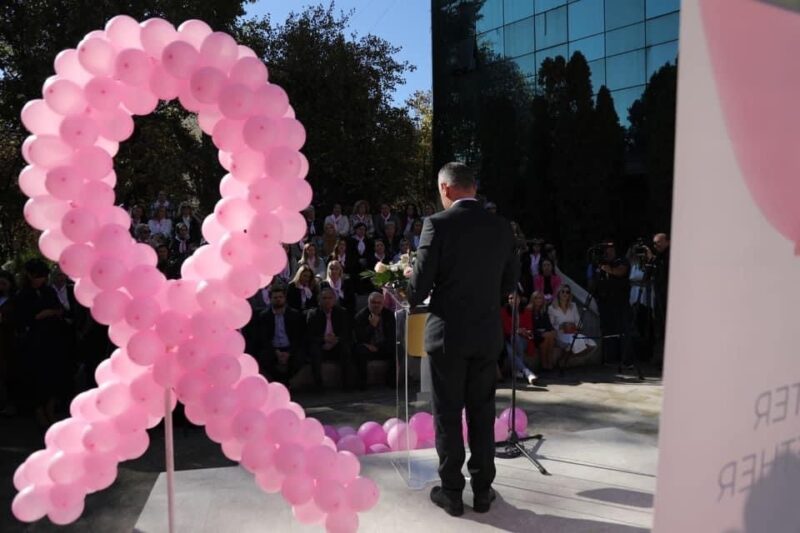Emanuela Dodeva, Co-Founder and President of EZRA, shared a post on LinkedIn:
“Cancer is a disease that knows no borders. It affects millions worldwide, presenting a universal challenge that nations across the globe are striving to combat. Yet, in Macedonia, the fight against cancer is marked by a unique set of obstacles that make the battle here particularly daunting.
These challenges are not just about the disease itself but are deeply intertwined with systemic issues within the country’s healthcare system—issues like corruption, inadequate funding, and an alarming loss of public trust.
As the founder of EZRA, a non-governmental organization dedicated to supporting cancer patients, I have witnessed these challenges firsthand, and I feel compelled to share our story in the hope of driving meaningful change.
The Beginning: Personal Loss and a New Purpose
My journey with EZRA began from a place of deep personal loss and frustration. After witnessing the painful battle my grandmother endured with cancer, and her passing just a few days after I gave birth to my child, I was left heartbroken.
The juxtaposition of life and death in such close succession brought clarity to my purpose: I needed to channel my grief into something constructive, something that could help others avoid the same pain and despair.
This was the catalyst for the creation of EZRA, an organization built on the foundation of hope, advocacy, and a relentless pursuit of better healthcare for all.
The Harsh Realities of Cancer Care in Macedonia
In Macedonia, the state of healthcare presents a grim reality, especially for those battling cancer. The system is plagued by declining funding, rampant mismanagement, and pervasive corruption, resulting in one of the lowest levels of healthcare expenditure in Southeastern Europe.
Despite the growing awareness of breast cancer, the necessary infrastructure to support early detection and effective treatment remains woefully inadequate.
Imagine being told that early detection is your best hope for survival, only to find that the system designed to protect you is failing at the most crucial stage. This is the reality for many women in Macedonia, where the availability of mammogram appointments is severely limited.
And we all know that delays that can be deadly in the fight against breast cancer. Each day of waiting could mean the difference between life and death, yet the system moves slowly, leaving women to navigate a perilous waiting game.
And even when the disease is caught in time, the journey is far from over. The continuity of care is fraught with obstacles. Patients often face bureaucratic red tape, limited access to the latest treatments, and a lack of funding for advanced medical technologies.
These challenges mean that many cancer patients do not receive the comprehensive care they desperately need, diminishing their chances of survival.
The underfunding of the healthcare system has led to severe shortages of essential medications, creating a situation where cancer patients must endure critical delays in treatment or, in some cases, go without the medications that could save their lives.
The frustration and fear of being denied necessary care are palpable, as patients and their families grapple with the system’s inadequacies.
Mismanagement only exacerbates the crisis. Consider the case of a multimillion-dollar particle accelerator, a piece of equipment vital for advanced cancer treatments, which was left unused due to administrative neglect. This technology, which could have saved countless lives, sits around gathering dust instead of being used for radiation therapies.
Adding to these challenges is a significant shortage of medical staff. The ongoing exodus of trained professionals seeking better opportunities abroad has left our healthcare system struggling to maintain even basic services. For those remaining, the workload is overwhelming..
Looking ahead, the situation is poised to worsen. Projections indicate a steady rise in new cancer cases, from an estimated 11,856 in 2020 to 15,517 by 2040. While this increase mirrors global trends, the compounded issues within Macedonia’s healthcare system make the impact here far more severe.
Over the past two decades, cancer mortality rates have been steadily rising, a tragic reflection of the systemic failures that plague our country’s healthcare infrastructure.
These are not just statistics—they are the lives of our mothers, sisters, daughters, and friends. The challenges are immense, but they also underscore the urgent need for reform. The fight against cancer in Macedonia is not just a battle against a disease; it is a battle against a broken system that must be fixed if we are to offer our people the care they deserve…
The Global Contrast: Where North Macedonia Stands
On a global scale, the fight against cancer has seen remarkable progress. In many high-income countries, comprehensive national screening programs, advanced treatment options, and robust support systems have become the norm.
These advancements are not merely about extending life but also about significantly improving the quality of life for cancer patients. Early detection, access to cutting-edge therapies, and holistic care approaches have transformed what was once a devastating diagnosis into a more manageable, and often survivable, condition.
However, in Macedonia, we are still grappling with the basics. The stark contrast between our situation and that of other nations is a sobering reminder of the disparities that exist in global healthcare. Here, the infrastructure necessary to support even the most basic aspects of cancer care is lacking.
Our patients, many of whom have been faithfully contributing to the Health Insurance Fund for years, find themselves marginalized and discriminated against by a system that is supposed to protect them. The scarcity of regular access to modern therapies is not just a logistical issue; it is a moral and ethical crisis.
Why should a patient in Macedonia be denied the chance to extend their life simply because they do not live in a country with more advanced healthcare infrastructure?
This disparity is deeply troubling, particularly when considering the rapid advancements being made globally. In many parts of the world, cancer care is moving towards personalized medicine, where treatments are tailored to the individual’s genetics, increasing the chances of success.
Meanwhile, in Macedonia, we struggle to provide even the standard care that should be available to all.
The consequences of these disparities are stark. The survival rates for cancer patients in Macedonia lag significantly behind those in more developed countries. This is not due to a lack of will or determination on the part of the patients and healthcare providers but rather a systemic failure that leaves our people at a distinct disadvantage.
The global fight against cancer is one of progress and hope, marked by incredible medical advancements and a commitment to improving patient outcomes. Yet in Macedonia, it often feels like a fight for survival against a system that is not equipped to support those in need.
This contrast is not just unfair; it is unacceptable. It highlights the urgent need for reform and investment in our healthcare system to ensure that our patients have the same fighting chance as those in more developed parts of the world.
Advocacy and Hope
When I embarked on this journey, I could never have imagined how profoundly it would shape my life. Founding EZRA was born out of personal loss, but it quickly evolved into a mission much larger than myself. At EZRA, our goal is clear: to be a beacon of hope and a force for change in the battle against cancer in Macedonia.
Our mission at EZRA is multifaceted, addressing both immediate needs and long-term challenges. At the heart of our work is a commitment to raising awareness about cancer, particularly the critical importance of early detection and regular screenings.
We strive to educate the public, empowering individuals to take control of their health through knowledge and proactive measures. Awareness is the first line of defense against cancer, and we are dedicated to ensuring that everyone in Macedonia understands the importance of early action.
But awareness alone is not enough. We also provide direct support to cancer patients and their families, offering psychological and social services that help them navigate the emotional and physical toll of the disease.
Our support network includes therapy sessions, counseling, and community outreach programs designed to create a strong, supportive environment for those in the fight of their lives. We believe that no one should have to face cancer alone, and at EZRA, we are committed to standing by our patients every step of the way.
Beyond these immediate services, EZRA is also deeply involved in advocacy. We recognize that to truly make a difference, we must push for systemic change at the highest levels. Our work is driven by the belief that every life is valuable and that every patient deserves a chance to fight cancer with dignity, support, and hope.
This is more than just a battle against a disease; it is a battle for justice, dignity, and the fundamental right to healthcare. We are fighting not just for survival, but for a future where cancer patients in Macedonia receive the same level of care and compassion as those in more developed countries.
As we look to the future, we must recognize that the fight against cancer in Macedonia cannot be won in isolation. We need to learn from global successes and adapt those strategies to our context.
We must advocate for better funding, more resources, and systemic changes that will allow us to close the gap between where we are and where we need to be. Our patients deserve no less.”

For more posts like this, visit oncodaily.com.
Emanuela Dodeva is the Co-Founder and President of EZRA, an organization that ensured that every patient has access to essential support. She is also the Founder and CEO of Detectra.io, a health-focused technology company. Previously, she worked in Training and Development within Human Resource Management at the Alliance of Patients Organisations (APO).


